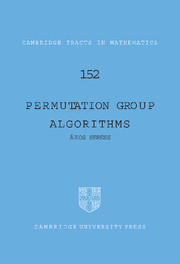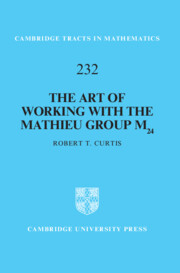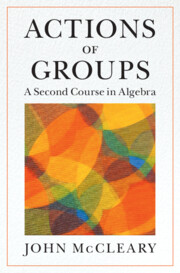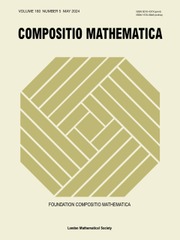Permutation Group Algorithms
Permutation group algorithms are one of the workhorses of symbolic algebra systems computing with groups. They played an indispensable role in the proof of many deep results, including the construction and study of sporadic finite simple groups. This book describes the theory behind permutation group algorithms, including developments based on the classification of finite simple groups. Rigorous complexity estimates, implementation hints, and advanced exercises are included throughout. The central theme is the description of nearly linear time algorithms, which are extremely fast both in terms of asymptotic analysis and of practical running time. A significant part of the permutation group library of the computational group algebra system GAP is based on nearly linear time algorithms. The book fills a significant gap in the symbolic computation literature. It is recommended for everyone interested in using computers in group theory, and is suitable for advanced graduate courses.
- Makes use of the computational group algebra system GAP
- Based on the author's own courses
- Covers very recent developments
Reviews & endorsements
'The book will be an invaluable tool for anyone who is interested in permutation groups, computational group theory or the broader area of computations involving symmetries and deserves a space on the shelf of any researcher in these areas.' Zentralblatt für Mathematik
'… this monograph by Akos Seress, one of the leaders in the field, is a welcome contribution. … the monograph is welcome not only for giving us an encyclopaedic account of the area, but also for its timeliness. A good author of a good book stamps his or her tastes and expertise firmly on the pages. That is what has happened here. In particular, because it should be of lasting value, it is a very appropriate addition to the Cambridge Tracts.' Peter M. Neumann, The Queen's College, Oxford
Product details
May 2003Hardback
9780521661034
274 pages
231 × 157 × 23 mm
0.52kg
30 b/w illus.
Available
Table of Contents
- 1. Introduction
- 2. Black-box groups
- 3. Permutation groups: a complexity overview
- 4. Bases and strong generating sets
- 5. Further low-level algorithms
- 6. A library of nearly linear time algorithms
- 7. Solvable permutation groups
- 8. Strong generating tests
- 9. Backtrack methods
- 10. Large-base groups.










